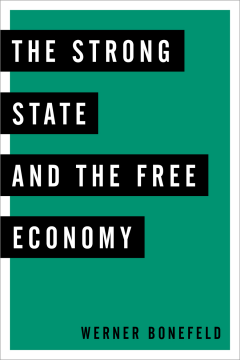
Additional Information
Book Details
Abstract
German ordoliberalism originated at the end of the Weimar Republic (1918-1933) in a context of hyper-inflation, depression, mass unemployment and social unrest. For ordoliberalism, a free economy is premised on a sound political, legal, social and moral framework to secure its cohesion. The role of the state is to ensure a liberal economic order.
Ordoliberalism is a contested account of post-neoliberal political economy: some argue that it offers a more restrained and socially just market order; others, in complete contrast, that is a form of authoritarian liberalism and that it is the theoretical foundation for the austerity politics that the EU has actively promoted in recent years.
Foucault discusses ordoliberalism at length in The Birth of Biopolitics, and Bonefeld’s book provides a thought-provoking companion to those lectures by offering a more comprehensive investigation of the theoretical foundation of ordoliberal thought and its historical and theoretical contexts.
Werner Bonefeld … argues powerfully that neoliberalism is a political project grounded in a strong state. A free economy, he argues, is built through a state that protects itself from democratic interests and imposes an order of economic liberty on society. … Bonefeld’s historical reach and theoretical acumen clarify many obscure problems regarding neoliberalism and its development. His book is an important and timely analysis of the political form of neoliberalism, as well as a welcome contribution to the on-going crises of the present capitalist order.
Bonefeld provides an insightful and rigorous account of ordoliberalism by carefully revealing its integral role in rendering the European project as a stateless liberal market framework. Bonefeld’s book will be of great value to those interested in understanding more about the role and nature of the state in contemporary European capitalism.
Susanne Soederberg, Professor of Global Development Studies at Queen’s University, Canada; author of Debtfare States and the Poverty Industry
Werner Bonefeld has produced an indispensable guide to ordoliberal thought and its relevance to the politics of the European Union. … In short, it is essential reading. … the principal message to take from this very valuable text is that the 'social market economy' does not socialise the market economy or place social controls on the market, but on the contrary, it ensures the 'free economy' through political intervention in society.
Werner Bonefeld is Professor of Politics at the University of York, UK.
At a time where discussion of the EU has degenerated into opposed normative judgements regarding its desirability, Bonefeld’s intervention enables a more critical perspective to be developed, one which foregrounds class struggle and the consequent necessities of state management in a society constituted through the antagonism of labour and capital.
This is such an important book that it would be a great shame if scholars of both ordoliberalism and European integration did not engage with it. This thoughtful and well-argued volume should indeed be mandatory reading for anyone wanting to have informed opinions about European politics or even the muchdiscussed relationship between state and economy in general.
Werner Bonefeld’s latest book is a powerful, perceptive and persuasive analysis of recent developments in contemporary political economy. Bonefeld breaks new ground in his treatment of ordoliberalism by tracing both its intellectual history and its relationship to the development of the European Union. The Strong State is an insightful, wide-ranging and incisive analysis impressive in its sweep and critique.
Peter Burnham, Professor of Politics and International Studies, University of Birmingham
Ordoliberalism, much discussed, poorly understood. The Strong State and the Free Economy convincingly challenges common misconceptions and steps into the mindsets of the original ordoliberal thinkers to reveal the anti-democratic core of the ordoliberal utopia. The book, like no other, teases out hitherto unexplored dimensions, amongst which the importance attached to competitive labour markets - the key adjusting mechanism in the contemporary architecture of the Economic and Monetary Union.
Angela Wigger, Associate Professor Global Political Economy, Radboud University
The core paradox of Ordoliberalism is that an efficient and harmonious free market system requires a strong “market police” state imposing strict competitive rules while individuals become natural entrepreneurs— an 'artificial' order in contrast to the 'spontaneous' order of laissez faire. In this definitive study, Werner Bonefeld demonstrates an extensive knowledge of the literature and analyzes its key tensions, contradictions, and policy implications.
Philip G. Cerny, Professor Emeritus of Politics and Global Affairs, University of Manchester and Rutgers University-Newark
Table of Contents
| Section Title | Page | Action | Price |
|---|---|---|---|
| The Strong State and the\rFree Economy | Cover | ||
| Contents | vii | ||
| Acknowledgements | ix | ||
| 1 The Strong State and the Free Economy: German Ordoliberalism, Political Theology and European Democracy | 1 | ||
| 2 The Free Economy as Political Practice | 19 | ||
| 3 Democracy and Freedom: On Authoritarian Liberalism | 47 | ||
| 4 Economic Constitution and Social Order: On the Freedom of Complete Competition | 69 | ||
| 5 Social policy: From the Class Society to the Enterprise Society | 93 | ||
| 6 Europe and the Idea of Subsidiarity: On the Elements of Ordoliberalism | 115 | ||
| 7 European Monetary Union: Economic Constitution and Ordnungspolitik | 135 | ||
| 8 Authoritarian Liberalism and the Euro: On the Political Theology of the Executive State | 155 | ||
| Bibliography | 171 | ||
| Index | 191 |
